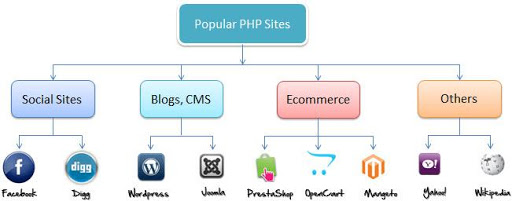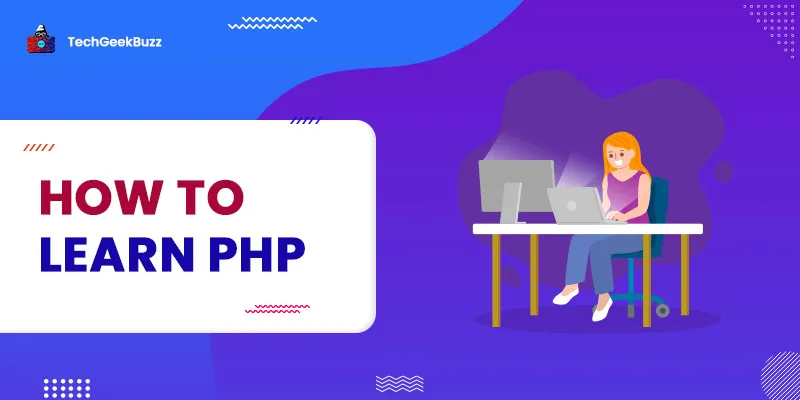PHP initially stood for Personal Home Page, but after some years, it was changed into Hypertext Pre Processor, a general-purpose, object-oriented programming language designed for web development. PHP was initially designed and developed by Rasmus Lerdorf. PHP codes can be embedded into HTML code and used with various web frameworks, web template systems, and web content management systems.
PHP code uses an interpreter to execute its code that is implemented as a module in a web server or it can be a Common Gateway Interface (CGI) executable also. Zend Engine provides the standard PHP interpreter and free software under the PHP License. So let's discuss the Best Way to Learn PHP.
Best Way to Learn PHP
PHP is the most widely used scripting language that runs on the server. It is an open-source language and free to download, and easy to use. Before going with PHP, you must know HTML, CSS, and JavaScript .
What is Scripting Language?
A set of programming instructions is called the script, which is interpreted at runtime. When these scripts interpret at runtime, it is known as the scripting language. Scripts are usually required for other software environments to be embedded into. The main purpose of using the scripts is to enhance performance or to perform routine tasks for an application.
There are two types of scripts- one is server-side and the other client-side. When the scripts are interpreted on the server, it is called server-side, while the client application interprets client-side scripts.
PHP is a type of server-side scripting language that is interpreted on the server, while an example of client-side scripting is JavaScript which is interpreted by the client-side browser. PHP and JavaScript both can be embedded into HTML pages.
Difference between Scripting and Programming Language
| Scripting Language | Programming Language |
| In this type of language, the source code executes without compiling | Source code needs to be compiled before the execution of that. |
| It supports mostly routine tasks. | A programming language supports all tasks required to develop a complete application. |
| This is required to embed in the other software environments | This doesn’t need to embed any other languages. |
Why is PHP very popular?
PHP is the core of the biggest blogging platform WordPress, and it is deep enough to handle the biggest social media platform Facebook.
Here are some of the main reasons why PHP is very popular amongst developers and programmers, or it can say the features that make PHP different from others.
- PHP is freely available, very simple, and easy to learn the language.
- PHP is an interpreted language that doesn’t need any compilation.
- PHP supports a large community for help.
- Regularly updated to keep up to date with the latest technology trends.
- PHP generates dynamic page content.
- PHP is also used to send and receive cookies.
- PHP can design dynamic web pages and collect form data.
- PHP can perform commands like create, open, read, write, delete, and close on the server for the file.
- By using PHP, you can perform operations such as adding, deleting, and modifying your database.
- PHP can encrypt data.
- PHP has the power to control user access.
PHP Syntax
PHP syntax includes various data types, functions, and objects. PHP code starts with <?php, and in the end, we add ?>. A valid PHP statement always ends with a semicolon (;). PHP files extension is “.php”.
Syntax:
<?php
// Source code here.
?>
PHP Example
<!DOCTYPE>
<html>
<body>
<?php
echo "<h2>Hello by PHP</h2>";
?>
</body>
</html>
Output: Hello by PHP
Advantages of PHP
1. Open-Source
PHP is an open-source scripting language and is freely available for use. Its large community provides support to PHP developers whenever needed.
2. Cross-Platform
PHP is highly compatible with all leading operating systems such as Linux, Windows, Mac OSX, Solaris, OpenBSD, etc. PHP supports all major web servers, including Apache, iPlanet, IIS, etc.
3. User-friendly
PHP codes are very easy and user-friendly, giving developers more flexibility than other languages. This helps PHP sites to generate more traffic.
4. Power
Now with the help of PHP, we can easily develop from small websites to giant business and organizational websites, chatting platforms, informative forums, CRM solutions, community websites, e-commerce shopping carts, e-business, gigantic database-driven sites, and shopping carts.
5. Extensions
PHP supports many libraries and extensions that extend its core functionalities. To include these custom-created extensions and components, source PHP code can be modified to increase extensibility.
6. Quick
PHP is mainly designed for web development and therefore works with HTML and URLs, and the things like GET and POST methods are built-ins in PHP. That makes it concise to develop a website.
7. Security
PHP is a secure language, and it helps to prevent malicious attacks.
8. Easy Development
You can easily make a website by giving a few dollars a month to the hosting companies for a PHP server.
9. Automatically Refreshes
Dynamic websites have the feature of automatically refreshing and do not need to make any changes manually. Therefore dynamic websites are in huge demand.
Big Companies Using PHP
 These are some of the names which are using PHP
These are some of the names which are using PHP
- Google (Few of the apps are done using PHP)
- Yahoo (Lots of apps are done using PHP)
- Rediff (Many apps are done using PHP)
- WordPress
- Wikipedia
- MailChimp
- Tumblr
- Yahoo!
- DailyMotion
- Etsy
- Slack
- Intel (Few apps are using PHP)
- Zynga
- Flickr
- Digg
Best Ways to Learn PHP
In this digital and technical world, if you want to learn PHP now on your own, you can do it. There are so many resources available, including online and offline, both by which you will become a successful PHP developer with regular practice and disciplined learning.
To help you with that, we have provided a list of online and offline resources from which you can start learning.
Online Resources
e-Books
1. Build Your Own Database-Driven Web Site Using PHP & MySQL
By Kevin Yank
This book will give you complete knowledge about how to use PHP and MySQL. By using this, you will be able to create your database-driven website.
2. Webmonkey’s PHP and MySQL Tutorials
By Webmonkey
This is another book for beginners, which is by the popular resource Webmonkey.
By Andi Gutmans, Stig Bakken, and Derick Rethans
4. PHP Reference Beginner to Intermediate PHP 5
By Mario Lurig
An excellent book with over 250 PHP functions with explanations. Also included the basics of PHP, regular expressions syntax, additional tips, MySQL query examples, and two indexes to help you find information faster.
Video Tutorials
1. PHP Academy
This is a great resource for those who want to learn something specific in PHP.
This tutorial has videos of 6 to 22 mins in length. This is worthwhile for beginners.
3. Derek Banas's Video Tutorial on YouTube
Derek Banas’s YouTube video tutorial is useful if you need a quick recap. It is not a guide, tutorial, or reference material. Use it for a fast recap.
4. Wild Academy Video Tutorials on YouTube
Tutors of this tutorial, Jack Williams and Mike Wieger, have the skills required to assist any PHP enthusiast. The concepts are well explained in depth in the tutorials.
5. CodeAcademy Video Tutorials
This academy’s way of explaining the Object-Oriented Concepts of PHP is worth gaining knowledge of.
Websites
1. PHP Manual7
A comprehensive guide to PHP programming.
This mainly focuses on the PHP definition, methods, and commands for use.
This is for beginners and consists of a big list of downloadable videos that will help you to know the basics of PHP.
4. PHPBuddy
This is designed to help you learn about PHP programming, including online tutorials, articles, and lessons.
5. CodeCourse
This is a PHP academy that has large descriptive content. They have a tutorial on their website as well as on YouTube.
Offline Resources
Best Books for PHP Programming
Professional PHP6
By Ed Lecky Thompson, Steven D. Nowicki, and Thomas Myer Publisher: Professional PHP6
Amazon: Professional PHP6 A book from Wrox’s Programmer-to-Programmer series, which always gives the best to learn for developers. This book concerns the ins and outs of PHP, including object-oriented ideas and aspects with examples that will transition well into PHP6 whenever it is released. Classes, iterators, names, etc., are well explained in the book.
Learning PHP, MySQL, and JavaScript: A Step-by-Step Guide to Creating Dynamic Websites
By Robin Nixon Publisher: Learning PHP, MySQL, and JavaScript: A Step-by-Step Guide to Creating Dynamic Websites
Amazon: Learning PHP, MySQL, and JavaScript: A Step-by-Step Guide to Creating Dynamic Websites
Are you afraid of MySQL ? Ever heard of JavaScript? Don’t worry. This book is to help you in that case. The book is full of examples and a step-by-step process for building dynamic websites.
PHP Solutions: Dynamic Web Design Made Easy
By David Powers Publisher: PHP Solutions: Dynamic Web Design Made Easy
Amazon: PHP Solutions: Dynamic Web Design Made Easy
This book is for those developers who already know how to use PHP and want to learn more in-depth workings of the language.
Beginning PHP and MySQL: From Novice To Professional
By W. Jason Gilmore Publisher: Beginning PHP and MySQL: From Novice To Professional
Amazon: Beginning PHP and MySQL: From Novice To Professional
This book is about a large number of different PHP technologies. The book explains how repositories, third-party libraries, ideas, and tools are used to wrangle all the functionality you can from PHP. Things like email, authentication, and LDAP connectivity are just a few of the things covered in this book.
Head First PHP & MySQL
By Lynn Beighley and Michael Morrison Publisher: Head First PHP & MySQL
Amazon: Head First PHP & MySQL
A perfect book for beginners to both PHP and programming in general. It is easy and fun to read and does an excellent job of communicating basic programming concepts. This is for anyone looking to learn how to program in PHP.
Summary
After going through this complete article, you are completely aware of PHP and how you can easily learn this language. This has so many opportunities to build your career with PHP.
You may start learning this language independently with the help of the available resources here at TechGeekBuzz .




